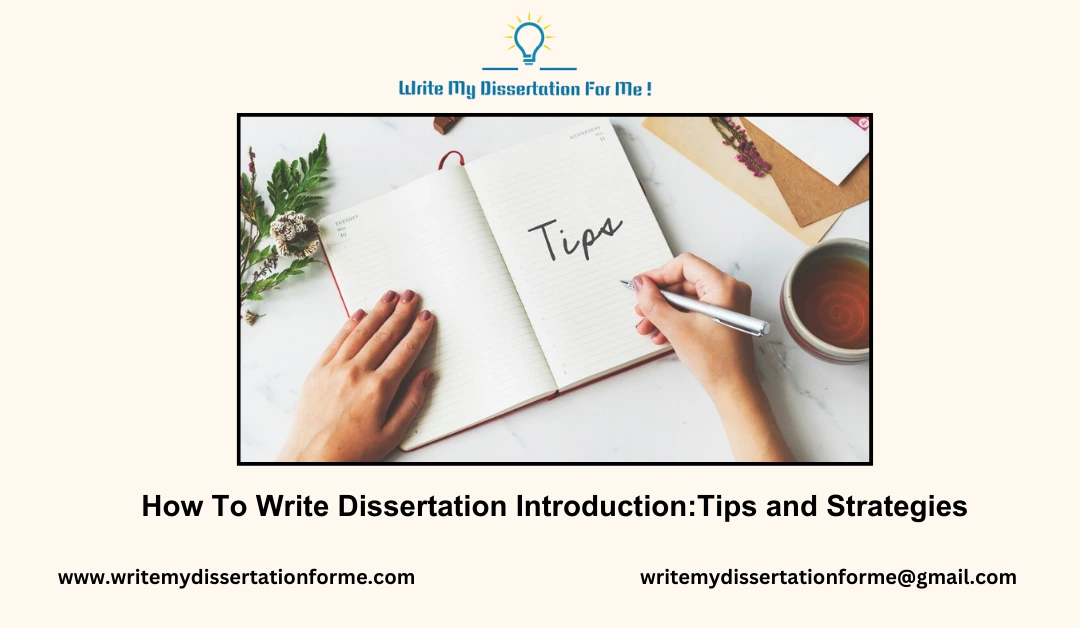Dissertation Introduction Writing for Non-Native English Speakers
December 24 2024 | 04 min read

Writing a dissertation beginning can be a difficult endeavor, particularly for non-native English speakers. The opening provides the initial impression of your work and sets the tone for the remainder of the dissertation. It is the section that introduces your research issue, defines your aims, and offers background for your study. Language barriers might make this process difficult for non-native speakers, but with the correct tactics and resources, you can create an engaging introduction.
In this blog, we will explore practical suggestions and tactics for non-native English speakers to create a successful dissertation introduction. Whether you're thinking about asking, Can someone write my dissertation introduction for me? or you intend to work alone, this guidance will help.
Understanding the Purpose of Dissertation Introductions
The dissertation introduction serves numerous important purposes:
- Contextualizing the Research: It gives readers background information to help them appreciate the significance of your study.
- Stating the study Problem: Clearly state the problem that your study addresses and why it is important.
- Presenting Objectives and Questions: Emphasize the study's goals as well as the research questions you hope to answer.
- Explaining Methodology: Briefly describe the approaches you will use to perform your research.
- Establishing the Scope: Define the scope of your research and specify what will and will not be explored.
For non-native English speakers, clarity in these sections is essential. Avoid jargon and instead use clear language to effectively explain your views.
Common Challenges for Non-native English Speakers:
Non-native English speakers may confront various obstacles when writing their dissertation introduction.
- Language Barriers: Grammar, vocabulary, and syntax errors can make writing in English difficult. Mistakes in these areas may result in a misinterpretation of your findings.
- Academic writing style: The formal tone of academic writing may be alien. It's critical to use the appropriate style, which emphasizes objectivity, clarity, and precision.
- Structure & Organization: It can be challenging to organize ideas cohesively. Non-native speakers may struggle to organize their introductions rationally
- Communication Differences Based on Culture: Cultural differences in communicating ideas may influence how arguments and objectives are presented.
Tips on Writing a Dissertation Introduction:
Here are actionable advice for non-native English speakers:
1. Start with a plan:
Before you start writing, outline the main points of your introduction. Break it down into pieces.
- Background
- Research Problem
- Objectives and Questions
- Brief methodology.
- Scope and Limitations
A clear structure will help guide your writing and ensure that nothing is neglected.
2. Use simple, clear language:
Avoid unnecessarily complex statements and obscure terms. Use straightforward, direct words to express your ideas. Use Grammarly or Hemingway Editor to improve your writing.
3. Refer to the Sample Introductions:
Examine examples of well-written dissertation introductions, preferably in your subject of study. These can both inspire and explain expectations.
4. Seek feedback early:
Share drafts of your introduction with your peers, mentors, and academic advisors. Constructive feedback might help you find areas for growth.
5. Leverage Technology:
Bridge understanding gaps by using language tools and translation software. Applications such as QuillBot or Wordtune can reword sentences to improve clarity.
6. Concentrate on Flow and Transitions:
Ensure that each portion of your introduction flows seamlessly into the next. Transitional phrases such as "Moreover," "However," and "As a result" help improve cohesion.
Key Components To Include:
1. Background Information:
Begin by introducing your research topic. Explain its value and relevance in your field. For example:
"Climate change is an urgent worldwide issue that has serious consequences for biodiversity and ecological stability. This study investigates the effects of rising temperatures on migratory bird patterns.
2. Statement of the Problem:
Clearly describe the problem that your study addresses. Identify gaps in the existing literature or unresolved topics.
"Despite extensive studies on climate change, limited research has focused on its effects on avian migration patterns in tropical regions."
3. Research Objectives and Questions:
Define your study's aims and provide your research questions. Ensure these are consistent with your methodology and findings:
"The fundamental goal of this study is to investigate the relationship between temperature changes and migratory timing. The research questions include: "What are the major factors influencing migratory shifts?"
4. Methodology Overview:
Give a brief explanation of your study methodology. Avoid going into too much detail; leave that for the methodology chapter.
"This study employs a mixed-methods approach, combining quantitative analysis of migration data with qualitative interviews with ornithologists."
5. Scope & Limitations:
Set the bounds of your research. Recognize constraints to establish realistic expectations.
"This research focuses on migratory patterns in Southeast Asia and does not encompass other geographical regions."
How Dissertation Writing Service Can Help:
Non-native English speakers who are feeling overwhelmed can benefit greatly from expert dissertation writing services. These services specialized in:
- Language refinement involves improving grammar, vocabulary, and sentence structure.
- Academic Standards: Ensure that your writing fulfills academic norms.
- Customization: Adapting content to meet your research needs.
- Feedback Integration: Revising drafts depending on your supervisor's feedback.
If you've ever thought, Can someone write my dissertation introduction for me? then the answer is yes. Professional services can help you overcome language hurdles and concentrate on your research.
Mistakes To Avoid:
1. Overload of Information:
Your introduction should provide an overview rather than a deep analysis. Avoid giving unneeded details.
2. Use Informal Language:
Keep a polite tone throughout. Avoid contractions (like "don't") and colloquialisms.
3. Neglecting Proofreading:
Always proofread your work. Minor errors can have a significant impact on readability and believability.
4. Ignoring Feedback:
Be open to suggestions from supervisors and peers. Constructive criticism is necessary for improvement.
Conclusion:
Writing a dissertation beginning as a non-native English speaker is obviously difficult, but it is fully possible with the proper approach. Emphasize clarity, order, and respect to academic standards. Seek feedback and use the available resources to improve your work. Remember, if you're stuck, expert dissertation writing services can help.
By following these guidelines, you may write an engaging and well-structured beginning that serves as a solid basis for your dissertation. Whether you write it yourself or ask, Can someone write my dissertation introduction for me? the goal is to ensure that your introduction successfully communicates the significance of your research.
If you loved reading this, please share this,
also read

AI in Accounting: Dissertation Ideas for Modern-Day UK Accountants
The use of Artificial Intelligence (AI) in accounting processes in the digital age is not only revolutionizing the field but ...

Innovative Management Accounting Dissertation Ideas for UK Students
A dynamic and constantly changing field, management accounting is essential to firms' ability to make strategic decisions. Re...

How To Write Dissertation Introduction: Tips and Strategies
The dissertation introduction is the first step in your research process; it draws the reader in and sets the scene for what ...